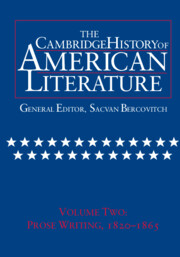Book contents
- Frontmatter
- Introduction
- CONDITIONS OF LITERARY VOCATION
- THE LITERATURE OF EXPANSION AND RACE
- THE TRANSCENDENTALISTS
- NARRATIVE FORMS
- 1 Establishing National Narrative
- 2 Local Narratives
- 3 Personal Narratives
- 4 Literary Narrative
- 5 Crisis of Literary Narrative and Consolidation of National Narrative
- Chronology
- Bibliography
- Index
2 - Local Narratives
from NARRATIVE FORMS
Published online by Cambridge University Press: 28 March 2008
- Frontmatter
- Introduction
- CONDITIONS OF LITERARY VOCATION
- THE LITERATURE OF EXPANSION AND RACE
- THE TRANSCENDENTALISTS
- NARRATIVE FORMS
- 1 Establishing National Narrative
- 2 Local Narratives
- 3 Personal Narratives
- 4 Literary Narrative
- 5 Crisis of Literary Narrative and Consolidation of National Narrative
- Chronology
- Bibliography
- Index
Summary
WASHINTON IRVING
In The Sketch Book of Geoffrey Crayon, Gent. (1819) Washington Irving established for decades the norms defining American local narratives, that is, small-scale pieces with regional subject matter. The basic modes of writing in Irving's work, as in the English periodicals of his time and in American periodicals for decades, were the sketch and the tale. The sketch, as its name suggests, is like a picture. Nothing happens in the sketch, except for the verbal action of displaying to the reader something that the narrating voice considers of interest. In the tale something does happen, often something rather remarkable. The sketch highlights the first-person narrative, as of the “Crayon” figure; the tale, in contrast, presents a third-person narration or else gives the narrative to another voice than that of the sponsoring narrator. Irving's voice echoed British tradition in periodical writing, and much of his subject matter resembled the colorful regionalism in Walter Scott's full-length romances. A sketch was, in effect, a descriptive chapter torn from its narrative context. By the same process, during the 1830s and 1840s, while George Bancroft and James Fenimore Cooper continued their writing, national narrative was being fragmented into local scenes by periodical writers following Irving.
Irving's most famous tales from The Sketch Book display a problematic relation between local and national. “Rip Van Winkle” notoriously passes over the founding American national events during Rip's protracted slumber, and the tale itself is attributed to Diedrich Knickerbocker, Irving's fictional antiquarian historian of Dutch New York.
- Type
- Chapter
- Information
- The Cambridge History of American Literature , pp. 629 - 660Publisher: Cambridge University PressPrint publication year: 1995

